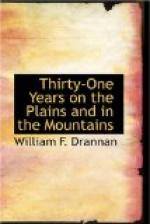Nawasa said: “Yes, I see her every few days.”
I asked her what size the girl was, and from what I could learn she was almost grown.
I asked her if the girl was satisfied, and she thought she was not, saying she was held a prisoner and had to do the work for the Indian families, or lodges, as she termed them. She said the work consisted of getting the wood and water, and whatever little cooking was to be done.
The reader will understand that while the, Apaches were hostile toward the whites, and the Pimas were not, yet the two tribes were always on peaceable terms. But I could see at a glance that those two Indians felt a deep interest in that white girl. I asked Nawasa how far it was to where the white girl was. After studying awhile, she said it was about six hours, meaning six hours’ ride.
I asked her when she would see the girl again, and she made me understand that if it would please me, or be of any benefit to the girl, she could see her most any day, saying that she went near the village to gather huckleberries, this being the time of year the red huckleberries are ripe in this country.
I told them that I would come back in four days, and then I would go with them to that place to gather huckleberries.
I wanted to look over the ground before laying my plans for taking the girl, provided she wished to leave the Indians.
This ended the conversation, so we went back to camp, where I found Jim Beckwith and a crowd of Indians joking, smoking and having a good time generally, for, as I have said before, this was the most sociable tribe of Indians that I ever saw.
On our arrival at camp, Jim asked me in Spanish where I had been, and when he saw the Indian girl, said: “Oh, I see; you have been off courting;” and then he and the Indians had a laugh at my expense.
I did not say anything to Jim about what I had heard until the next day.
We started early in order to make the trip in one day. I told him the story just as I had it from the two Indians, and told him that I was going to try to get the girl away from the Apaches if she wanted to leave them.
I rode along some distance, apparently in a deep study, and he finally turned to me and said:
“I think you had better let that gal alone, for then. Apaches is the wust Injuns in the hull country. If you make the attempt and they ever git on your track, they’ll run you down in spite o’ you.”
To the readers of this book I will say I never was more astonished in my life, than I was to hear Jim Beckwith talk as he did. In all the time that I had been with him, this was the first time I had ever seen the slightest indication of his showing the white feather, as we termed it. It seemed to me he had lost all his nerve.
I said: “Jim, my mind is made up; if that white girl is dissatisfied and wants to leave the Indians, I am going to make the attempt, and trust to luck for the balance.”




